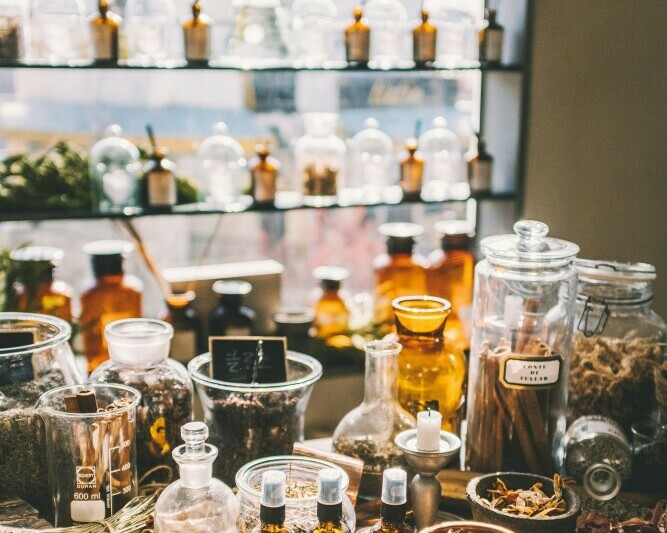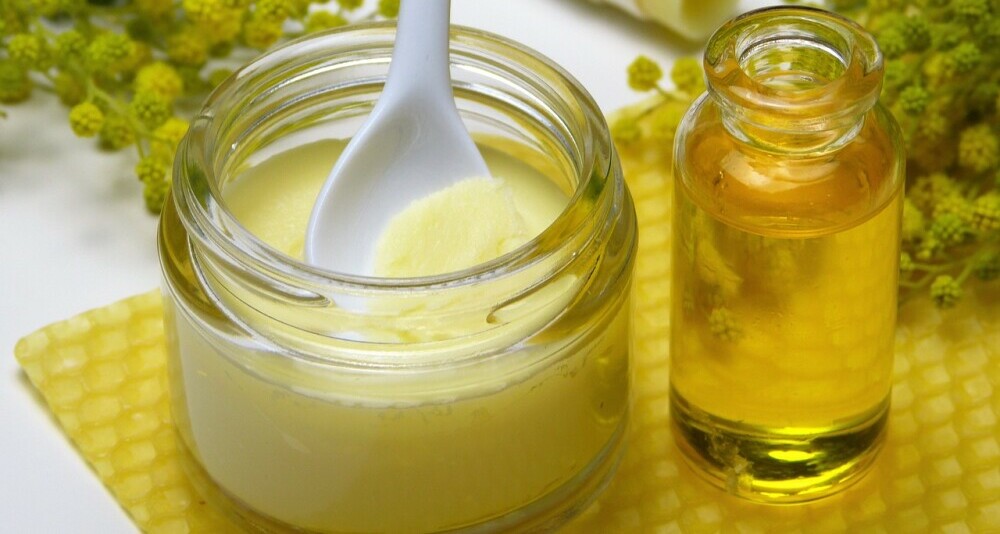THE INGREDIENTS IN YOUR COSMETICS
The long text on the back of your cream or cleansing gel probably promises great things: more moisture, an even complexion, fewer blackheads… It’s all very tempting, because we all want a glowing complexion.
But no matter how well a product is advertised, it’s the ingredients that matter. Conventional cosmetics and skincare products are often full of them, and you’re probably not familiar with most of the terms. These terms refer to fillers, plasticizers and preservatives of synthetic or even petroleum-based origin.
These ingredients provide consistency, are generally inexpensive, and promise to make your skin feel good, if only for a short time. On the other hand, they leave a film on the skin that prevents the skin from losing moisture, but at the same time inhibits the natural processes of respiration and renewal. Metabolic waste products are eliminated through the skin, which is why it is considered one of the body’s most important detoxification organs. When this natural cleansing process is inhibited, toxins remain in the body. This is especially true over the long term.
Before we get to the benefits of natural cosmetics, we’d like to give you a list of the most important ingredients to avoid.
INGREDIENTS TO AVOID
Parabens: Preservatives suspected to be endocrine disruptors.
Kerosenes: cheap petroleum-based oil substitutes that can deposit harmful substances in the body.
PEGs (polyethylene glycol, sodium lauryl sulfate, etc.): surfactants/emulsifiers, often petroleum-based, that weaken the skin’s barrier function, can trigger allergies and may be pathogenic.
Aluminum salts: antiperspirants that clog pores. Aluminum can also bind to the body in harmful ways.
Nanoparticles/microplastics: suspected of binding pollutants. Disastrous consequences for the environment. Sunscreens (benzophenones). These UV filters are partly endocrine disruptors and can accumulate in the body, even in breast milk.
Petroleum/mineral oils in general: Inexpensive raw materials that are used, for example, in place of real oils. However, these are considered to be of potential concern.
What you’ll quickly find when you research these ingredients is that they are :
Potentially harmful, sometimes highly pathogenic, and used in many cosmetics and skin care products.
The good news is that nature has always provided us with everything we need to live. While some may consider skin care to be overkill and a supplement, it’s important to question your routine because :
The skin is our shield and detoxification organ, enveloping our organs and muscles and repelling all kinds of external influences.
People who feel good about themselves show it and feel more confident in the face of external « aesthetic pressures ». Skin care is therefore also a very important aspect when it comes to overall well-being.
Natural cosmetics companies are committed to eliminating all of the potentially harmful ingredients mentioned above. Instead, they use original natural sources. Authentic oils and fragrances, natural fats and time-tested, traditional active ingredients all have their place in natural cosmetics.
BENEFITS OF NATURAL COSMETICS AND SKIN CARE

So, don’t contain parabens, kerosene, etc… but what exactly does that mean? Let’s take a closer look at the benefits and answer a few questions.
The priority of your cosmetics should be the care and well-being of your skin. Once again, nature is the best way to achieve this goal, as we can draw on many years of experience with natural raw materials used in a traditional way. Although it may take longer to see the desired results, you’ll find that natural ingredients have a positive and lasting effect on your well-being.
An important advantage of natural skin care and cosmetics is that they should not contain perfumes, dyes or chemical preservatives. Those of you with sensitive skin know why these are a problem. For example, in addition to their potentially allergenic component, chemical fragrances have the disadvantage of being difficult to break down and can accumulate both in nature and in the human body.
The environmental impact of natural cosmetics is much lower than that of conventional cosmetics. The absence of microplastics (such as glitter) and other substances that can be harmful to the environment contributes to a greener footprint.
FRAGRANCES AND PRESERVATIVES IN NATURAL COSMETICS
Natural fragrances, such as essential oils, are not only more subtle than their chemical counterparts, they are also considered beneficial to the mind and body.
Tip: Always look for quality and origin, and choose organic oils whenever possible.
The Problem of Preservation…
Nothing lasts forever… and skin care products are no different. There are several ways to protect these products from microbial deterioration. Conventional cosmetics use a simple technique: parabens. Inexpensive and convenient, they are also endocrine disruptors and harmful to the environment. But don’t worry, it’s also possible to preserve skin care products naturally for a reasonable period of time.
Preserving Oils
Some oils, such as jojoba oil, are highly stable and can act as a preservative for other oils. From a practical point of view, jojoba oil is also a real all-rounder when it comes to skin care.
Antioxidants
Antioxidants are our favorites, which is why you’ll find them in both our supplements and natural cosmetics. The benefit: they’re natural anti-aging agents. Just think of what a few drops of lemon can do to a sliced apple. Vitamin E, for example, is a natural antioxidant.
Essential Oils
Essential oils have a long history in natural medicine. They are used for a variety of purposes, both internally and externally. Due to their antibacterial function, essential oils are often used in natural cosmetics, especially in combination with other natural preservatives.
Packaging and Preservation
Quality raw materials feel best and last longest in well-protected packaging. Brown glass, for example, is ideal, and if you keep it cool at home, you’ll enjoy your products for a long time.
OILS FOR NATURAL SKIN CARE
Oils are great for skin care because their structure is similar to that of fats produced by the body. This means they are easily absorbed and nourish the skin’s deepest layers. Oils are gentle and suitable for all skin types. They can be left in their natural state as they have some natural preservative properties and are also full of nutrients for your skin.
Oils strengthen, heal, moisturize and leave the skin feeling soft. All of this is especially true when used properly.
Our tip: Apply the oil to moist skin as this is the best way to absorb the oil without stripping the skin of its natural oils.
OILS FOR ALL SKIN TYPES
In general, oils are very gentle on the skin. Whether your skin is dry, sensitive or oily, natural oils work for all skin types. For example, you can optimize your skin care routine by using the oils that best suit your skin type. Comedogenicity plays an important role, especially when it comes to dry versus oily skin. « Comedo is the Latin word for blackheads, so it’s best to use low-comedogenic oils for skin that is prone to blemishes. On the other hand, mildly comedogenic oils can be useful for dry skin.
Things to remember: The appearance of skin can change over the years and even during the menstrual cycle. That’s why a complete skin care routine, preferably adapted to both dry and oily skin, is appropriate.
HOLISTIC SKIN CARE ADVICE
Skin care is an important part of a holistic approach. After all, our skin is there to protect us, and we can help it do so. Natural, nourishing and strengthening products are the first step. But there are other things you can do to enhance the effects of your natural skin care products and achieve the greatest possible well-being.
Massage
Massages don’t just relax muscles – they can also have a positive effect on your overall facial expression. Massages also stimulate blood circulation, resulting in a better distribution of nutrients and giving your skin a rosy, glowing appearance. What’s more, massages can help strengthen your connective tissue, which can help prevent things like stretch marks. In combination with high-quality oils, all these effects can be optimally supported.
Nutrients from Within
Skin care doesn’t have to be all about the outside. Since your skin needs vitamins and nutrients, you can also help it from the inside out. Certain vitamins are essential for skin care. For example, vitamin C and biotin are important.
Self Care
Our skin often reveals what’s going on inside. It’s a detoxifying organ, but it’s also an indicator of our moods… That’s why our feelings and emotions can affect the health of our skin. Feeling good about your body has a positive effect on the whole organism. Taking care of yourself holistically can therefore do wonders for your skin, but more importantly, for your overall well-being.
Food is not the only element of a holistic, toxin-free lifestyle. Your environment, and specifically everything your skin comes in contact with, can also affect your well-being. Some environmental factors are difficult for us to control – all the more reason to actively optimize the things you can do yourself.


